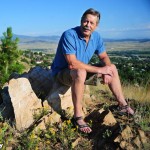 From working as a timber faller and a tree doctor to profiling environmental protestors and parsing through his own preoccupations with Ken Kesey, Fred Haefele has followed his curiosity into the most extraordinary corners of the place he’s chosen to call home. This anthology of seventeen pieces of nonfiction gives us access not only to one of our most talented writers, it shows us the unique emotional and social topography of a region. It’s an essential addition to any western bookshelf.
From working as a timber faller and a tree doctor to profiling environmental protestors and parsing through his own preoccupations with Ken Kesey, Fred Haefele has followed his curiosity into the most extraordinary corners of the place he’s chosen to call home. This anthology of seventeen pieces of nonfiction gives us access not only to one of our most talented writers, it shows us the unique emotional and social topography of a region. It’s an essential addition to any western bookshelf.
About Fred Haefele
Previously the author of the award-winning memoir, Rebuilding the Indian (“a universal roar,” USA Today) Haefele’s work has appeared in publications including Outside, Salon, Wired, Big Sky Journal, and the New York Times.
Book Information
Dimensions: 5 x 8
Price: $16.95
Release Date: September 10, 2011
Purchasing
Purchase Online
Purchase Online
Purchase Signed Copies
Country Bookshelf
Fact & Fiction
Endorsements
“Extremophilia contains fantastic, intelligent writing about a life well-lived, unfolding in the way that the best lives proceed: in exciting rushes and tumbles that are punctuated by spells of luminous, mysterious beauty and sudden, if sometimes brief, understanding.”
— Rick Bass, author of The Wild Marsh
“The West, as filtered through Fred Haefele’s utterly distinctive sensibility, is a gorgeous giant with a dark laugh. Romantics don’t quite understand that, but these clear-eyed essays do. Read them.”
— Deirdre McNamer, author of Red Rover
Excerpt
 While I spent the 1970s climbing for every piratical dingdong who ever made a buck off a tree, my University of Montana MFA classmates were fresh-faced and unsullied. They were better read, had actually written stories, and most of them cared little about the life of hard-knocks I’d bet the farm on. A few older writers, however, did. Now in our thirties, we vetted each other’s authenticity, embraced the style known as “dirty realism,” and wrote stories about hard-living tradesmen, Nam vets and guys who didn’t take any shit. We thought it dishonest to write of things purely imagined rather than things we’d actually done. Possibly this came from a suspicion contemporary fiction was dominated by bloodless East Coast aesthetes whose privileged lives made them contemptuous of the world as we knew it. Or possibly it was just a hedge against the limits of our talent.
While I spent the 1970s climbing for every piratical dingdong who ever made a buck off a tree, my University of Montana MFA classmates were fresh-faced and unsullied. They were better read, had actually written stories, and most of them cared little about the life of hard-knocks I’d bet the farm on. A few older writers, however, did. Now in our thirties, we vetted each other’s authenticity, embraced the style known as “dirty realism,” and wrote stories about hard-living tradesmen, Nam vets and guys who didn’t take any shit. We thought it dishonest to write of things purely imagined rather than things we’d actually done. Possibly this came from a suspicion contemporary fiction was dominated by bloodless East Coast aesthetes whose privileged lives made them contemptuous of the world as we knew it. Or possibly it was just a hedge against the limits of our talent.
Throughout it all, I maintained the belief that my connection to Ken Kesey was unique. Had he not, after all, transformed me from a lowly cravat salesman to a genuine hard-nosed high-limb man? I was surprised to discover how many of my writer friends felt a similar connection, and it took me a while to understand that this was one of Kesey’s gifts.
— Fred Haefele
From “Prankster, Pass By”











